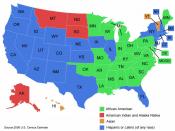Diasporas and what is behind thembased on"The erosion of American national interests"by Samuel P. HuntingtonRecently, a new phenomenon has risen in the United States: based on the Huntington article, it appears that most American people has ceased to support the policy of their government, and they are not willing to devote support and effort to purposes, which are not clearly defined or generally accepted.
Huntington says that with the loss of the common "enemy", all institutions and capabilities of foreign policy either need to find a new enemy in order to justify their own existence, or they will inevitably become "suborned and redirected to serve â¦even non national purposes." Huntington.
The basic contradiction in American foreign policy is that it should serve commercial goals - rather than being served by them. The above mentioned non national interests are referred to as ethnic interests, and these ethnic groups prove to be useful for other countries, people or nations than the United States. Add to that the consequent flows of immigration, the need of tolerance towards minority groups and their increasing financial stability and travelling opportunities which make it possible to keep in touch with their home countries - what emerges from it is a group of foreign people who do not identify themselves with the (more and more shallowing) interests of their host-country but start strongly representing the real or conceptional interests of their real home countries, and, doing so, they can even endanger the host country. This is the phenomenon in connection with the minority groups Huntington calls diasporas.
The greater extent a country is exposed to immigration, the greater the danger is to the self-formulation of diasporas. The clout of these diasporas to the foreign policy is far from being trifling, and shows an increasing tendency.


